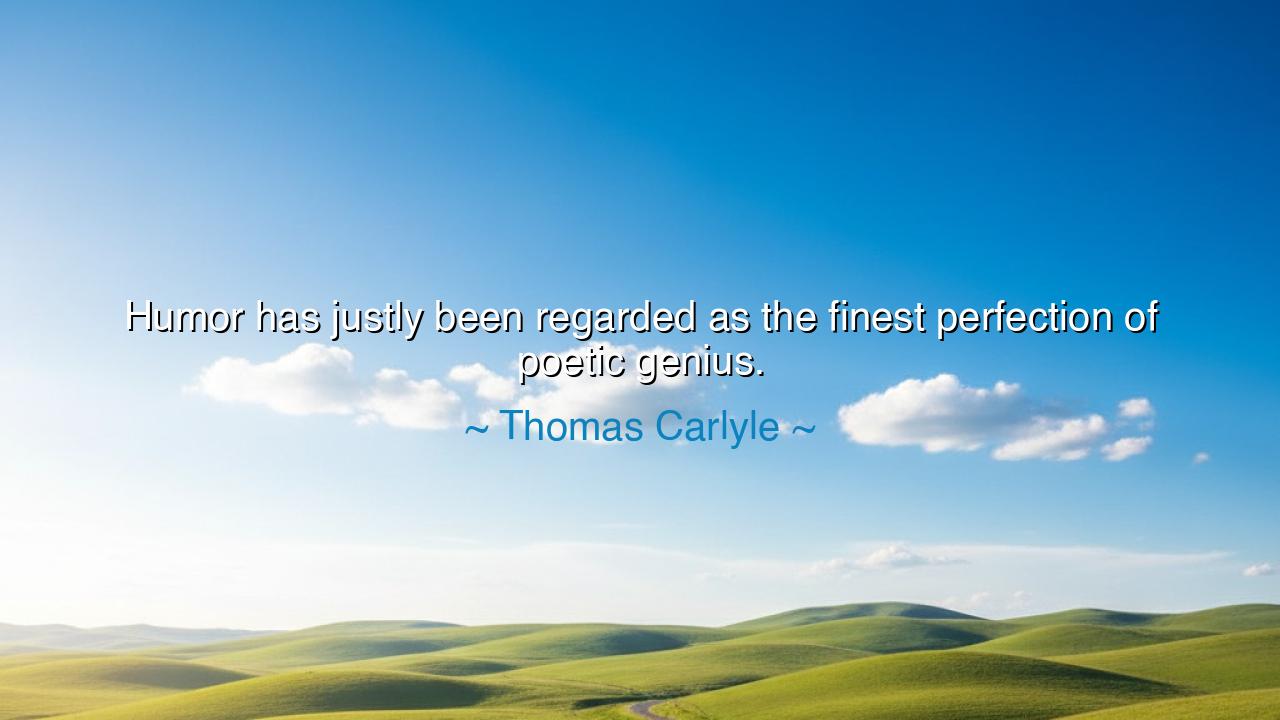
Humor has justly been regarded as the finest perfection of poetic






In the profound and timeless words of Thomas Carlyle, the sage of moral strength and intellectual fire, we encounter a truth that glows like an ember within the heart of creation: “Humor has justly been regarded as the finest perfection of poetic genius.” To the careless ear, this may sound like simple praise of wit, but in truth, it is a declaration of spiritual insight. Carlyle, who saw life as a ceaseless battle between the divine and the absurd, knew that humor was not the laughter of the foolish — it was the laughter of the wise. It is the highest flowering of understanding, the grace born when the soul sees both the pain and the beauty of existence and smiles at the paradox.
The origin of this quote lies in Carlyle’s lifelong contemplation of art, faith, and the human spirit. Living in the storm of the 19th century — a world torn between faith and reason, industry and nature, suffering and progress — he sought to define what true genius meant. To him, the greatest poets were not merely dreamers or singers of love, but seers — men and women who could look into the depths of human experience and still find cause for compassion and laughter. Thus he declared humor the “finest perfection” of poetic power, for it is humor that reconciles opposites — it lifts tragedy into understanding, and pride into humility. The poet who possesses humor, Carlyle believed, possesses the heart of humanity itself.
The ancients, too, knew this sacred truth. Socrates, who was said to laugh even at death, used irony as his sword — a humor so deep it pierced falsehood with gentleness. Aristophanes, the playwright of Athens, clothed his wisdom in jest, mocking the powerful yet teaching the people. For to the Greeks, laughter was divine — the gift of Hermes, the messenger of the gods, who bridged heaven and earth with a smile. Humor, then, was not frivolity; it was balance — the ability to see life from the height of eternity, where joy and sorrow cease to be enemies. Carlyle’s insight joins this lineage of ancient wisdom: that humor is not the absence of seriousness, but its highest expression.
Consider the story of Abraham Lincoln, whose humor became his shield and his torch. In the midst of civil war, burdened with the fate of a nation, he would ease the tension of his generals and soothe the fears of his people with stories and gentle laughter. Many mistook his humor for lightness — yet behind his smile stood the gravity of compassion. His wit was not escape, but endurance; it was the mark of a spirit that understood the weight of suffering and refused to be crushed by it. In this, Lincoln embodied Carlyle’s truth: that humor is the perfection of genius, for it springs from wisdom joined with mercy.
To possess humor, in the truest sense, is to perceive the contradictions of life without despair. It is to know, as Carlyle knew, that the world is both ridiculous and sacred, that man is both broken and divine. Humor does not mock existence — it redeems it. The poet who laughs at humanity’s follies does not despise mankind; he loves it too deeply to remain silent. His laughter is a form of forgiveness, a light that softens the hardness of truth. When we laugh with understanding, we do not escape reality — we embrace it fully, without fear.
Thus, Carlyle’s teaching is not merely for poets, but for all who would live wisely. To cultivate humor is to cultivate peace. It is to stand in the storm and still find joy in the sound of the thunder. The humorless mind is brittle, breaking under the weight of its own gravity; but the mind that laughs with reverence is supple, bending but never breaking. This humor is not cynicism, for cynicism destroys; nor is it jesting for vanity’s sake, for that is hollow. True humor, the kind Carlyle praised, is the laughter that comes after tears — the laughter that sanctifies pain and transforms suffering into song.
So, my child of the future, learn this from Thomas Carlyle and from all who came before him: seek humor not as escape, but as enlightenment. When life wounds you, do not let bitterness take root — let understanding bloom instead. When the world mocks you, answer not with anger, but with gentle laughter that disarms cruelty and reveals truth. Read the poets, listen to the storytellers, find the smile of wisdom in their words. For the one who can laugh at the tragic without losing compassion, who can smile at the absurd without losing reverence, has attained the highest art of all — the art of living.
And remember: humor, as Carlyle declared, is the final perfection of genius because it is the perfection of love. It is the soul’s confession that, despite all its trials, it still believes in beauty. To laugh wisely is to see life as the gods might see it — a vast, imperfect play, full of folly and grace, where even our tears are part of the divine comedy. Learn to laugh, then, not because the world is light, but because you are strong enough to carry its weight — and in that laughter, find your freedom.






AAdministratorAdministrator
Welcome, honored guests. Please leave a comment, we will respond soon